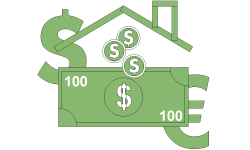In a recent survey, about one-third of respondents who earn less than $30,000 per year said is it a good idea to draw from home equity to pay for regular bills. That is about 3x the number who said it is a good idea in the $75,000+ income range. So who is right and when does a home equity loan or line-of-credit make sense? Let’s dive in and find out what makes the most sense for your personal finance needs.
What is home equity?
When you purchase a property, you typically have to put down a 20% payment to get started. In the world of real estate, that 20% down is your starting home equity in most cases. That 20% represents the portion of the home you own after paying off the mortgage.
If your home value increases over time, which it should in most cases, your home equity increases. As you pay down your mortgage, you get another boost to home equity. To calculate your current home equity, subtract your mortgage balance from your home’s estimated value. To get the home equity percentage, divide your home equity by the value of your home.
For example, if you own a home worth $400,000 and put down a $100,000 down payment, or 25%, you would end up with a loan for $300,000. Your home equity is $400,000-$300,000=$100,000. Your home equity percentage is $100,000/$400,000, or 25%.
Over time, if you pay off $100,000 of your balance and the home grows to a $500,000 value, now you owe $200,000 on a $500,000 home. Your equity would be $300,000 and your equity percentage would be 60%.
If you buy a home with less than 20% equity, you will owe private mortgage insurance (PMI) every month. In most cases, it is best to wait until you can afford 20% down before buying a home.
When should you use home equity?
Continuing the example above, you would have $300,000 in equity in your home. If you were to sell today for $500,000, you could pay off the $200,000 mortgage and walk away with $300,000 in cash. But what if you want to keep your home and still get access to some of that $300,000? That is where home equity loans come in.
A home equity loan, or a second mortgage, is a fixed rate loan where you leverage home equity to borrow today. You have to pay that loan back just like a mortgage or face losing your home. Home equity loans charge interest until paid off.
Another option is a home equity line of credit, or HELOC. A HELOC works like a credit card, but it is attached to your home. If you stop paying a credit card, it hurts your credit score. If you stop paying a HELOC, it hurts your credit score and you can lose your home.
Home equity loans are risky if you can’t afford to pay them back. If you use home equity to pay for regular bills and lose your job or hit another financial hardship, it could cost you your home!
According to the Bankrate survey, 74% of homeowners think it is a reasonable use of home equity to pay for home upgrades and repairs. Over half think this is the best use of home equity. I’m inclined to agree.
Don’t treat equity like a bank account
Home equity is a valuable and long-term asset, similar to a retirement account. A paid off home means you have a place to live without a monthly cost (outside of taxes and insurance). Every time you take home equity, it puts you farther and farther from that goal.
My friend and fellow personal finance blogger Steve Stewart paid off his home and now lives 100% debt free. He would never tap into his home equity or take on any other debt. The risks far outweigh the benefits.
If you are in a position where a home equity loan is the only way to stay afloat, you may be living above your means to begin with. Take a hard look at your budget, your income, your savings, and overall financial plan. Try to get back on track to pay the bills without drawing from the bank of home. You’ll be glad you did.
















